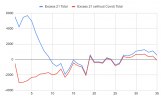Eyersey468
Established Member
- Joined
- 14 Sep 2018
- Messages
- 2,172
As some will know I work in the bus industry. The changes to people's commuting patterns, working from home etc is a concern to the industry as we need passenger numbers to return to 100% of pre Covid levels to be viable.


